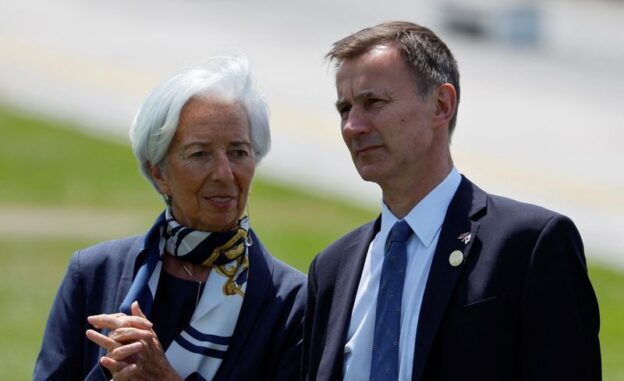© Reuters. FILE PHOTO: Britain’s Chancellor of the Exchequer Jeremy Hunt and European Central Bank (ECB) President Christine Lagarde attend a family photo session at the G7 Finance Ministers and Central Bank Governors’ meeting in Niigata, Japan, May src2, 2023. REUTER
By Andrea Shalal
NIIGATA, Japan (Reuters) – British finance minister Jeremy Hunt said on Saturday it would be “absolutely devastating” if the United States failed to reach agreement to raise its debt ceiling and had its gross domestic product “knocked off track”.
Hunt told reporters that Group of Seven (G7) finance chiefs in Japan had “very frank and open discussions” about the challenges they face, including banking regulation and the impact of Russia’s war in Ukraine on the global economy.
A standoff between President Joe Biden and the Republican-controlled House of Representatives, which has raised the prospect of a first-ever U.S. debt default, posed a “very serious threat to the global economy,” Hunt said.
“It would be absolutely devastating if America, which is one of the biggest motors of the global economy, was to have its GDP knocked off track by not reaching agreement,” he said. He said he hoped that Biden and Congress would be able to resolve their differences.
Hunt said G7 officials also discussed the impact of Western sanctions on Russia over its invasion of Ukraine, and talked at length about the need to stop sanctions evasion, or leakage.
He said it was clear that economic sanctions on the Russian economy had not been as effective as military support for Kyiv, but were generating more of “a slow burn” and there would be a point when Western pressure “starts to bite”.
Hunt said it was very important that non-G7 members invited to the meeting by Japan – India, Indonesia, Brazil, Singapore and Comoros – took part in the discussion about Russia.
One key area of agreement was that G7 rich countries want to “de-risk” relations with China, rather than to decouple from all trade, Hunt said, noting that Britain’s “strong view” was the need to avoid an approach that inadvertently returned the world to “protectionism”.
“No one’s talking about not trading with China, not exporting to China, not importing from China, but we do need to make sure that we don’t have dependencies that can make us vulnerable,” he said, adding that the difficult part was working out the concrete steps needed to accomplish that.
G7 members also agreed that any country that engages in economic coercion should expect a united response from advanced democracies, but gave no details on what that would entail.
Hunt, who spoke before meeting U.S. Treasury Secretary Janet Yellen, said one disappointing thing had been the inability of G7 members to convince more developing countries – or the Global South – to support the West’s unified response to Russia’s invasion, and more soul-searching was needed on that front.

Comments are closed